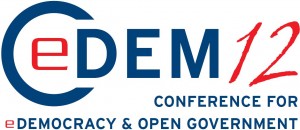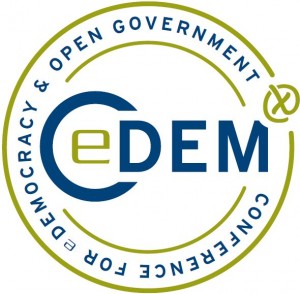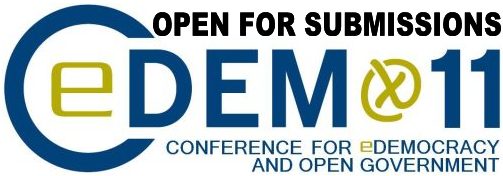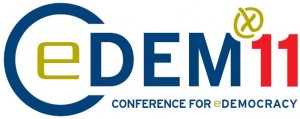Author Archive
 |
11. April 2014 – 15:14 by Centre for E-Government
|
The international “Conference for E-Democracy and Open Government, Asia 2014″ will be held in Hong Kong on 4-5 December 2014. Submission deadline is 15 July 2014: www.donau-uni.ac.at/cedem-asia-14

– – – – – – – – – – – – – – – – – – – – – – – – – – – – – – – – – – – – – – – – – – – – – –
The Hong Kong City University, the Danube University Krems and the University of Michigan jointly organise CeDEM-Asia-2014 with the following tracks:
SOCIAL MEDIA AND CITIZEN PARTICIPATION
– Social media, citizen mobilization & engagement
– Sustainability of e-participation
– Social movements and citizen networks
– Online campaigning and elections
E-GOVERNMENT AND OPEN GOVERNMENT
– ICTs and their use for governmental transformation
– Open data, transparency, participation and collaboration in government
– Cultures of governance, access and openness, crowdsourcing for government
– Roles of policy-makers, industry professionals, and civil society activists in facilitating open governance
– Electronic identity
– Cross-border interoperability of e-government artefacts approaches and standards
DIGITAL RIGHTS AND INTERNET FREEDOM
– Internet governance
– Internet freedom and censorship
– Surveillance, privacy, and cyber-security
– Digital divide and literacy
FUTURE AND EMERGING TOPICS
– Smart cities, citizen science and urban informatics
– Internet of things and government transformation
– Social media-enabled crisis and disaster management
– – – – – – – – – – – – – – – – – – – – – – – – – – – – – – – – – – – – – – – – – – – – – –
Read the rest of this entry »
Posted in Events, ICT | No Comments »
 |
12. October 2011 – 17:16 by Centre for E-Government
|
In modern democracies, people are to be empowered by means of information and communication technologies. Transparency and access to data, new ways of interacting with government and democratic institutions cause profound changes in society. Social media and the new forms of societal behaviour, including content generation, collaboration and sharing as well as network organisation change our understanding of politics and business. Governmental and private internet services have increased the citizens’ independence and flexibility. However, enthusiastic ideas and projects often failed to produce the expected results as technology is only the basis for new forms of organisation and interaction. CeDEM12 seeks to critically analyse present and future developments in e-democracy and open government. >> https://www.donau-uni.ac.at/cedem
CeDEM12 presents the following tracks:
- E-Participation

- Government 2.0
- Social/Web Media and Public Administration
- E-Politics and E-Campaigning
- European Citizen Initiative
- Participatory Budgeting
- Bottom-Up Movements
- Open Data and Open Access
Submission Deadline: 12/12/2011
.
We would like to invite individuals from academic and applied backgrounds as well as business, public authorities, NGO, NPOs and education institutions to submit their papers, reflections as well as workshop proposals. We welcome interdisciplinary approaches to the emerging conference topics. This year we want to encourage practitioners to submit papers as we provide a specific section for non-academics. Conference language is English.
.
Publications:
The conference proceedings will be published with the Edition Danube University; additionally, the complete proceedings will be made accessible online. A selection of best research papers and case studies of CeDEM12 will be published with the Open Access eJournal of eDemocracy and Open Government. (www.jedem.org)
- Research papers shall be 12 pages maximum and will be double-blind peer-reviewed.
- Case studies/project papers shall be 12 pages maximum and will be double-blind peer-reviewed.
- Reflections shall be 4 pages maximum and will be selected by the chairs.
You can download last year’s conference proceedings at the conference website!
Important Dates:
- Deadline for the submission of papers and workshop proposals: 12 December 2011
- Conference: 3-4 May 2012
Further Information
.
Posted in calls & tender, Events | No Comments »
 |
11. April 2011 – 15:28 by Centre for E-Government
|
 CeDEM11: The international “Conference on E-Democracy and Open Government 2011” takes place in Krems (Austria) on 5 and 6 May 2011. A substantial supporting programme has already been planned.
CeDEM11: The international “Conference on E-Democracy and Open Government 2011” takes place in Krems (Austria) on 5 and 6 May 2011. A substantial supporting programme has already been planned.
Follow these Links for further Information
www.donau-uni.ac.at/cedem
Posted in Events, Partners | No Comments »
 |
17. December 2010 – 12:21 by Centre for E-Government
|
Very snowed in, I enjoyed it: using the title of Steve Thompson’s keynote, it was “engagingly different”!
For a full review of the conference: see the Digital Government 2.0 Blog!
Posted in Events | No Comments »
 |
2. December 2010 – 11:49 by Centre for E-Government
|
On authors’ demand, CeDEM11 announces an extended deadline for submissions:
16 January 2011

Conference for E-Democracy and Open Government
5-6 May 2011
Krems, Austria
www.donau-uni.ac.at/cedem
Tracks
- E-Participation
- Open Data and Open Access
- Open Government
- E-Voting
Submissions
- Extended deadline: 16 January 2011
- 12 pages maximum
- Double-blind peer review
Conference Proceedings
- Print version and
- OA online version (eBook).
- Best papers will be published with the OA eJournal JeDEM
Detailed Information
Posted in Events, ICT, open data | No Comments »
 |
21. October 2010 – 15:29 by Centre for E-Government
|
Call for Papers
During the last 10 years, the world has focused on social media and the new forms of societal behaviour, including content generation, collaboration and sharing as well as network organisation. These behaviours and expectations, in particular transparency and access to data, new ways of interacting with government and democratic institutions will continue to develop, and profound changes in society are to be expected. Society has been confronted with Open Government, Open Data and Open Access. What have the experiences been so far? How do these impact society, democratic structures and organisations? What changes occur at citizen level? What are the implications for democracy, society, science and business?
The Conference for E-Democracy and Open Government - CeDEM11 – presents the following Tracks (Submission Deadline: 1 Dec. 2010):
E-Participation
- Julia Glidden (21C Consulting, UK)
- Jeremy Millard (Danish Technological Institute, DK)
- Norbert Kersting (Stellenbosch University, ZA)
Open Government
- Philipp Müller (University of Salzburg, Business School, AT)
- Axel Bruns (Queensland University of Technology, AUS)
E-Voting
- Melanie Volkamer (Technical University Darmstadt, GER)
- Thad Hall (University of Utah, USA)
Open Data and Open Access
- Andy Williamson (Hansard Society, UK)
Location: Danube University Krems, Austria
Date: 5-6 May 2011
Further Information at the Conference Website:
https://www.donau-uni.ac.at/cedem
DEADLINE for SUBMISSIONS: 1 December 2010
Posted in Events | No Comments »
 |
13. September 2010 – 10:00 by Centre for E-Government
|
For the ePart10 in Lausanne, Peter Cruickshank and I wrote about lurkers and their role in e-participation, to be precise, it was about signing an e-petition as a transition from lurking to participation.

Not the sort of lurker we’re talking about
We were thinking about the challenges that lurkers present to us as e-participation researchers, and to the democratic process in general: is being ‘a face in a crowd’ at a political demonstration a bad thing? (no) and is it similar to lurking online? (yes). After all, just spending time at a demonstration or following a political topic is still a commitment. Therefore lurkers are interesting to us in their own right, and should not be negatively portrayed. Lurkers are better than ignorers after all.
We can’t expect everyone to be an activist (the 90-9-1 rule); but if we can understand their motivations to lurk, and what could motivate people to start taking (online/offline) action by the simple act of signing a petition that’s even better, broadening the pool of available activists.
There’s already a huge body or research into the psychology of online participation – all we’ve tried to do here is link them to one specific e-participation technology, and suggest some implications for future research.
You can download the presentation via this link.
Any comments or hints about any research on lurkers& lurking in e-participation is welcome!
Posted in Events | 4 Comments »
 |
8. September 2010 – 16:13 by Centre for E-Government
|
CeDEM11 – Conference for e-democracy, e-participation and e-voting – brings together e-democracy, e-participation and e-voting specialists working in academia, politics, government and business.

Call for Papers
During the last 10 years, the world has focused on social media and the new forms of societal behaviour, including content generation, collaboration and sharing as well as network organisation. These behaviours and expectations, in particular transparency and access to data, new ways of interacting with government and democratic institutions will continue to develop, and profound changes in society are to be expected. Society has been confronted with “Open Government”, “Open Data” and “Open Access”. What have the experiences been so far? How do these impact society, democratic structures and organisations? What changes occur at citizen level? What are the implications for democracy, society, science and business?
CeDEM11 presents the following tracks, which focus on these changes:
Track: E-participation
Co-chairs: Julia Glidden (21c Consultancy, UK) and Jeremy Millard (Danish Technological Institute, DK)
Track: Open Access and Open Data
Co-chair: Andy Williamson (Hansard Society, UK)
Track: Open Government
Co-chairs: Philipp Müller (University of Salzburg, Business School, AT) and Axel Bruns (Queensland University of Technology, AUS)
Track: E-voting
Co-chairs: Melanie Volkamer (Technical University Darmstadt, GER) and Thad Hall (University of Utah, USA)
.
Deadline for submissions of papers and workshop proposals is 1 December 2010. Submissions shall be 12 pages maximum.
Read the rest of this entry »
Posted in Events, ICT, open data, Projects | No Comments »
 |
2. September 2010 – 17:00 by Centre for E-Government
|
The sub-catagories of the ePart 2010 (dedicated to topics on eParticipation and eDemocracy) were foundations, eParticipation initiatives, understanding & evaluation and ICT & eVoting. The conference was colocated with and held in parallel tracks to the EGOV 2010.
KEYNOTE
ANN MACINTOSH (UNIVERSITY OF LEEDS): ARGUMENT VISUALISATION ? THE KEY TO UNLOCKING ONLINE DELIBERATION??
„The trouble with socialism is that it takes up too many evenings.“ (Oscar Wilde)
Macintosh presentation focused on argument visualisation with reference to it’s possible value for policy making. Before combining these two research topics, she summarised the history and current state of research in the field of online deliberation by browsing to the main arguments of the following book titles which argue the need for deliberation:
- Hay 2007: Why we hate politics
- Stoker 2006: Why politics matter: Making demoracy work
- Fishkin 1991: Democracy and deliberation
- Dryzek 200: Deliberative democracy and beyon
Others then claimed a potential of the internet for enhancing deliberation, like Dahlgren 2005: The internet public sphere. Whilst this is not a new research area (see Dutton 1992: Political Science research on teledemocracy), with the more sophisticated technology of today we are moving from the traditional text-based to a new form of deliberation. And with people using the web 2.0 a much bigger audience is attracted. Macintosh argued that the linear form of information in debate fails to capture real life argument patterns and does not enable people to think of arguments. The capacity of technology has not been like we expected it in the 90ies. It’s potential to enhance democracy has not been realised yet. Why is that? The overall reason might be to many expectations: One one hand, we are expecting too much from governments and politicians (they need to give up power), on the other hand too much of the citizens (e.g. with reference to the digital divide). Not least we’re also expecting too much of technology.
Online deliberation presents large problem spaces. Coming up with an own opinion and to formulate an informal contribution is difficult, especially when taking into account the complexity of policy development. From the socio-technical perspective, the problems are the following:
- making sense of unstructured text
- knowing what critical questions to ask
- ensuring inclusive deliberation.
This is where argument mapping comes into play – seen as a tool to make sense of unstructured text and visualising language. Argument visualisation provides an alternative way of representing text in online deliberation forms. TheODET 2010 workshop was dealing with online deliberation tools emerging from the labs. If you are interested in argument mapping it is worth browsing the posts tagged „argument mapping“ on https://digitalcitizenship.co.uk where you’ll find a video covering some of the tools presented at the conference.
Read the rest of this entry »
Posted in Events | No Comments »
 |
2. September 2010 – 14:20 by Centre for E-Government
|
From August 29 to September 2 both the EGOV 2010 and ePart 2010 conferences (the ninth conference of the IFIP WG 8.5 group) took part in Lausanne, Mouline – a rather rural but overally nice area (one was literally facing cows when getting off the metro). This year the conferences were hosted at the Swiss Graduate School of Public Administration – IDHEAP. Some minutes of the keynotes and selected presentations of the first two days.
EGOV 2010 OPENING
The EGOV 2010 was taking place outside the DEXA framework for the first time this year, starting with some facts and figures about this year’s papers and the invitation to the next conference in Delfth (15 min. from Amsterdam) 2011. Keynote K. Holkeri from Finland focused on open and inclusive policy making.
Read the rest of this entry »
Posted in Events | No Comments »













